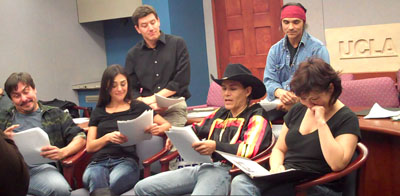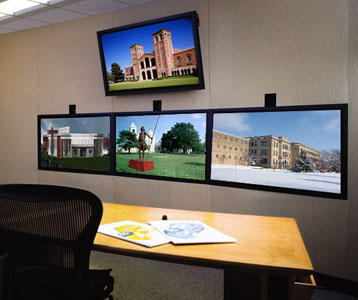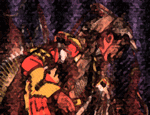2009 VIDEOCONFERENCE:
PROJECT HOOP CONFERENCE PARTICIPANTS AGREE TO FORM NEW PLAYWRIGHTS GUILD, NATIVE THEATER ALLIANCE
DECEMBER 4th NATIONAL VIDEOCONFERENCE HOOKS UP NATIVE THEATER ARTISTS AT SIX LOCATIONS
[For excerpts from three new plays read and performed by Native actors for 2009 Project HOOP videoconference, please click here]
 Native American theater and performing artists have taken initial steps to establish two national membership groups to represent and advocate for advancement opportunities and resources for Native theater artists and organizations. The move to create the two new bodies was a highlight action of the Project HOOP National Native American Theater and Performing Arts Videoconference held Friday, December 5th at six locations across the United States.
Native American theater and performing artists have taken initial steps to establish two national membership groups to represent and advocate for advancement opportunities and resources for Native theater artists and organizations. The move to create the two new bodies was a highlight action of the Project HOOP National Native American Theater and Performing Arts Videoconference held Friday, December 5th at six locations across the United States.
Conference participants agreed to appoint an eight-member steering committee to lay the groundwork for creating a National Native Playwrights Guild as well as a National Native Theater and Performing Arts Alliance. Panel members will help shape concepts and planning for the two new organizations when they convene in January for a two-day work session. Committee members are to be nominated by Native theater companies and community arts groups from around Indian Country.
“We’ll announce the committee appointments and meeting schedules within the next week,” said Hanay Geiogamah, Project HOOP principal investigator. “And we’ll select a location for the steering committee meeting as well.” Agenda topics for the January sessions include developing mission statements for the groups, outlining long-range goals, and devising funding strategies and campaigns. Also to be considered are establishing provisional boards of directors and various ad hoc committees.
Diane Fraher, executive director of the artists’ support and advocacy organization Amerinda in New York, told the conference, “I am fully supportive of the establishment of a Native Playwrights Guild and a National Native Theater Association. These have an enormous potential to serve all of us in contemporary Native literary and performing arts. Our artists have a powerful role to play in asserting our cultural sovereignty and defending our image. An organized platform that emerges out of artists and organizations grounded in community has the power to counter balance the abuse of our culture.”
Said Objiwe playwright and novelist Mark Anthony Rolo: “It’s imperative that we form this organization of playwrights for many reasons—to bring greater visibility to our artists and their work, to ‘reclaim’ authority over our images and stories, and to support and recruit and mentor new, younger playwrights with the hope of creating a wonderful, wild diverse canon of Native plays.” He added, “Our directors, technicians, designers, actors and other creative and production personnel should have the same support and advocacy.”
Rolo continued, “I want to stress the serious need to forming leverage on the theater industry---get the industry to recognize that Native theater is defined and expressed by Native artists and Native theater companies. If we believe that the arts play a huge role in strengthening and building community, then we need to shout out a collective voice. We are Native theater! We are Native community! We can no longer allow non-Native people and institutions to secure funding for their own agendas of what they believe represents Indian Country.”
Contemporary communications technology provided the platform for the December 5th videoconference, enabling Native American playwrights, actors, directors, designers and producers to gather at six sites across Indian Country. The national gathering was the seventh annual convening of Native theater artists and featured a nation-wide conversation on the state of Native theater and performing arts at the end of 2009. Muriel Miguel, founding director of the Spiderwoman Theater in New York City, told the conferees: “I’m hopeful. This is a new era. People will now [have to] think out of the box. It’s important to do this work. I refuse to be invisible.”
Referring to current economic downturn and its demoralizing effects on artists in all disciplines, Tuscarora playwright Vicki Ramirez of New York City said, “We all want to find a way to get paid.” Assiniboine playwright and director William Yellow Robe, Jr. told the conference from the University of Maine, “We’ve never had money. We have always existed in poverty. We won’t let it stop us. We can and will survive.”
The five and a half hour session connected participants at the University of Maine at Orono; Columbia University in New York City; the University of Wisconsin at Madison; the University of Kansas at Lawrence; Tulsa Community College West at Tulsa, and the University of California at Los Angeles. Hanay Geiogamah, professor of theater in the UCLA School of Theater, Film and Television, moderated the event from UCLA’s Powell Library Videoconferencing Center. Site coordinators included Kiowa playwright and actress Diane Reyner at the University of Kansas; Professor Julie Pearson-LittleThunder in Tulsa; Diane Fraher, Osage filmmaker and executive director of Amerinda, at Columbia University; Professor Margo Lukens at the University of Maine, and Mark Anthony Rolo at the University of Wisconsin.
“This was one of the most uplifting and helpful HOOP conferences we’ve had in a long time,” Geiogamah noted. “We’re getting better at using the videoconferencing format, and I’m pretty certain we will be using this technology a lot more to help bring us all together.” Other participants voiced appreciation and praise for the gathering:
Ojibwe playwright and novelist Mark Anthony Rolo wrote: “A very productive and inspiring videoconference. Thank you for organizing this historical conference. Just to hear what folks are up to throughout Indian Country with theater was worth the time and effort. A most productive and encouraging meeting.”
Professor Margo Lukens, Univeristy of Maine Department of English: “Thank you for providing the opportunity to videoconference with friends and colleagues around the country. We in Maine are honored and delighted to be conncted to Project HOOP, and we look forward to our next connection. So many conversations got started, it’s clear we have lots to share with each other.”
Mark Parra, Navajo actor based in Los Angeles: “It was an honor to be among so many talented Natives as part of this important and worthy project.”
2009 PROJECT HOOP PREMIERE VIDEOCONFERENCE: VIDEOCONFERENCE CONNECTS NATIVE THEATER ARTISTS IN SIX LOCATIONS AROUND INDIAN COUNTRY
Conference Program available for download here (PDF).
 Sharing encouragement and positive thoughts amid the economic gloom of 2009, an estimated 75 Native American theater and performing artists gathered in six venues across the country on Thursday, June 18 to take part in the first Project HOOP National Native Theater and Performing Arts Videoconference.
Sharing encouragement and positive thoughts amid the economic gloom of 2009, an estimated 75 Native American theater and performing artists gathered in six venues across the country on Thursday, June 18 to take part in the first Project HOOP National Native Theater and Performing Arts Videoconference.
The 2009 HOOP conference linked Native theater groups and communities in Los Angeles, at UCLA; in New York City at Columbia University; in Orono, Maine at the University of Maine; in Oklahoma at Northeastern State University in Tahlequah; the Forest County Potawatomi Reservation in Crandon, Wisconsin; and Haskell Indian Nations University and the American Indian Repertory Theater Company at the University of Kansas in Lawrence, Kansas.
A popular highlight of the gathering featured staged readings and performance excerpts from new short plays written by students as well as a professional production and a script developed by members of a tribal theater project. In place of a keynote address, a national dialogue, Native Theater and Performing Arts in Turbulent 2009, gave the conferees opportunities to speak out on pressing issues and challenges for Native theater and performing arts today.
Dialogue topics included an assessment of the number of viable companies, projects and productions that are currently happening in the national community, and also the status of individual artists, playwrights, actors, directors, designers, producers and organizers. Hanay Geiogamah, Project HOOP principal investigator and professor of theater in the UCLA School of Theater, Film and Television, moderated the dialogue from the videoconference studio in UCLA’s Powell Library.
Attendees in all six venues responded vigorously when asked to share thoughts on specific actions that could be taken now to improve the overall situation for Native theater and performing arts.
The conference also began a dialogue on proposals to establish a National Native Playwrights Guild and a National Native Theater and Performing Arts Alliance. Action on both proposals was continued through the early Fall season, when a second videoconference is planned. The playwrights guild would function for Indian dramatists in much the same way as the New York-based Dramatists Guild, while the Native Theater and Performing Arts Alliance would provide the Native theater community with services and programs similar to those of the Theater Communications Group (TCG), also based in New York.
“It really made me feel good to hear all that that is going on,” said Professor Julie Pearson Little Thunder, who coordinated the session at Northeastern State in Tahlequah. “I thought the students (in Wisconsin) did a wonderful job, and I was really impressed.” Professor Pearson Little Thunder is a playwright and director and co-founder of the Thunder Road Theater in Tulsa, Oklahoma, as well as a faculty member at Northeastern State.
Margo Lukens, associate professor of English at the University of Maine and coordinator for the Maine venue, said “We in Maine learned a lot, and we are already looking forward to connecting again in the early fall. This was an unprecedented opportunity to exchange thoughts, news and performances with colleagues around the country. We felt it was a privilege for our group to participate in the conversation with so many seasoned and established people in the national Native American theater scene.”
Professor Lukens is co-editor, with the playwright William Yellow Robe Jr., of Grandchildren of the Buffalo Soldiers and Other Untold Stories,” an anthology of Mr. Yellow Robe’s plays published earlier this year in the Native American Theater Series for Project HOOP. She was joined in the Maine venue by members of the Penoboscot tribal theater project that she and Yellow Robe have helped to developed over the past year at the Indian Island Penobscot tribal community.
Other venue coordinators included Murielle Borst of the Spiderwoman Theater Company, at Columbia University in New York City; Diane Reyer, artistic director of the American Indian Repertory Theater Company in Kansas City, MO., coordinating at the University of Kansas in Lawrence; and Mark Anthony Rolo, coordinating at the venue in Wisconsin with the Forest County Potawatomi Band.
A taped excerpt of Diane Reyner’s newest play, Woven Memory, was performed by members of the American Indian Repertory Theater. Students in Mark Anthony Rolo’s playwriting workshop for the Potowatomi Band read from four new playlets they had written just days before the videoconference event. The titles were The Path to Beauty, The Medicine Man, A Night Within A Day, and Young and Pregnant.
Members of the Penobscot tribal theater project performed an except from Pieces of Us, written by Mr. Yellow Robe in workshop collaboration with the group.
Taking place over a five and a half- hour time span, the session marked the first time a large group of Native American artists gathered in a videoconferencing format.

